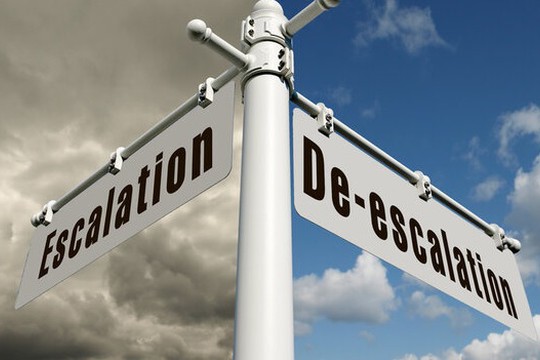Almost the entire team of Donald Trump’s advisers, along with his son (with the exception of the newly appointed Secretary of State, Marco Rubio), condemned Biden’s decision to allow Ukraine to target deep within Russian territory, writes Dimitris Konstantakopoulos, ex-advisor at the office of the Greek PM Andreas Papandreou on Arms Control and East-West relations.
However, the press secretary of the newly elected U.S. President subtly, but unmistakably, criticized them, stating that “only official statements on this matter will come directly from President Trump or his authorized spokespeople”. Neither Trump nor his spokesperson commented on Biden’s decision, and it would be highly unusual and contrary to standard protocol, if the decision to target deeply into Russia were taken without Biden briefing his successor on his plans during their private meeting the previous week. Especially since the U.S. military had opposed such a decision just a month ago. And as evidenced by the Pentagon spokesperson’s refusal to comment on the issue, it seems they still disagree.
These events likely support the view that it is more of a collusion between Biden and Trump rather than a unilateral decision by the outgoing U.S. President, as we argued in a previous article on the subject titled.
Moreover, the (foolish) idea of “escalation for de-escalation,” including the use of strikes deep within Russia, has been described in a post-election interview by Trump’s newly appointed National Security Advisor, Mike Walz. His rhetoric about Russia is also very revealing, displaying, among other things, glaring ignorance of Russian history and reality, as well as anti-Russian racism: “First of all, current energy sanctions on Russia must be strengthened… Russia is essentially a gas station with nuclear weapons.” It seems that he has not been affected at all by the fact that, with such views and Western policies, Ukraine has been defeated and the West itself has been isolated!
Today’s Western political and technical personnel have extremely limited political and general education. They have been raised in the era of complete American supremacy and have fought only from a position of overwhelming advantage (and even in those cases, they did not succeed very well). They have not (or do not want to) understand the Soviet collapse as anything other than proof of Russia’s total weakness and the West’s complete omnipotence.
They did not realize that the Soviet collapse was not solely the result of any weakness or serious problems within the USSR — although those existed — but was largely and primarily the result of the Soviet elites and much of society joining the Western narrative. This alignment had tragic consequences for the societies of the former USSR, for Russia’s international position, and for the 25 million Russians left outside Russia by the dissolution of the USSR, without any consideration of their right to self-determination. The emergence of the Putin’s regime, whether some like it or not, and its turn towards an increasingly combative challenge to Western policies was the unavoidable reaction of a historic nation and not a strange “anomaly” destined to disappear with some outside help, as the West would like to believe.
This lack of realism and deep understanding of the Russian and global situation led to the attempt to seize, even through coup-like methods, a part of the former USSR, and specifically such a crucial one as Ukraine, turning it into a dictatorship, a Western protectorate, and an armed anti-Russian bulwark, and preparing it to enter NATO. Subsequently, they did everything they could to provoke a conflict with Russia, hoping to overthrow its regime and break up the country.
Now they do not want to admit that they played and lost, even though the most prominent representative of Western geopolitics, Zbigniew Brzezinski, warned in his last writings that the “window of opportunity” for global American “monopoly” closed 15 years after the collapse of the USSR, and that this factor had to be taken into account when formulating policy.
In their panic and lacking of any coherent “winning” strategy, American “strategists” are pulling whatever idea they can from the tradition of US politics and applying it blindly to the current reality. David Ignatius for example, referring to Brzezinski, argued back in 2021 that a war in Ukraine would do to Russia what the Afghan war did to the USSR, i.e., it would destroy it. Utter nonsense — first, because Afghanistan played no central role in the Soviet collapse, and second, more importantly, because a conflict in Afghanistan cannot be compared to a conflict in the heart of Europe and the former USSR. Now Walz wants to “escalate to de-escalate,” mimicking Kennedy’s policy toward Vietnam (and somewhat the ideas that inspired NATO’s risky “flexible response” strategy), forgetting, however, that first, Kissinger’s policy failed, and the only thing it achieved was prolonging the Vietnam War, and second, that Vietnam cannot be compared to a nuclear and technological superpower like Russia.
Escalations lead usually to more escalations, not de-escalations. They are policies of desperation, not strategies of victory.
Even now, in the face of the prospect of a strategic defeat — or precisely because of the panic it provokes, and perhaps their fear that the Ukrainian regime could soon collapse — they are struggling to find the courage and rationality to end the conflict, accepting a neutrality arrangement for Ukraine. This, despite the fact that the possibility of a victory over Russia has become inconceivable, while the destructive consequences of further escalation grow ever more apparent.
They think they will communicate with Russia by launching missiles, not by talking to it!
read more in our Telegram-channel https://t.me/The_International_Affairs

 13:29 25.11.2024 •
13:29 25.11.2024 •























